Police Service's Struggle to Achieve Policing by Consent and Response to Black Lives Matter Protests
VerifiedAdded on 2023/06/18
|11
|3952
|429
AI Summary
This report analyses the struggle faced by the police in gaining public confidence, police response to Black Lives Matter protests, sources of funding and implications of austerity on the police.
Contribute Materials
Your contribution can guide someone’s learning journey. Share your
documents today.
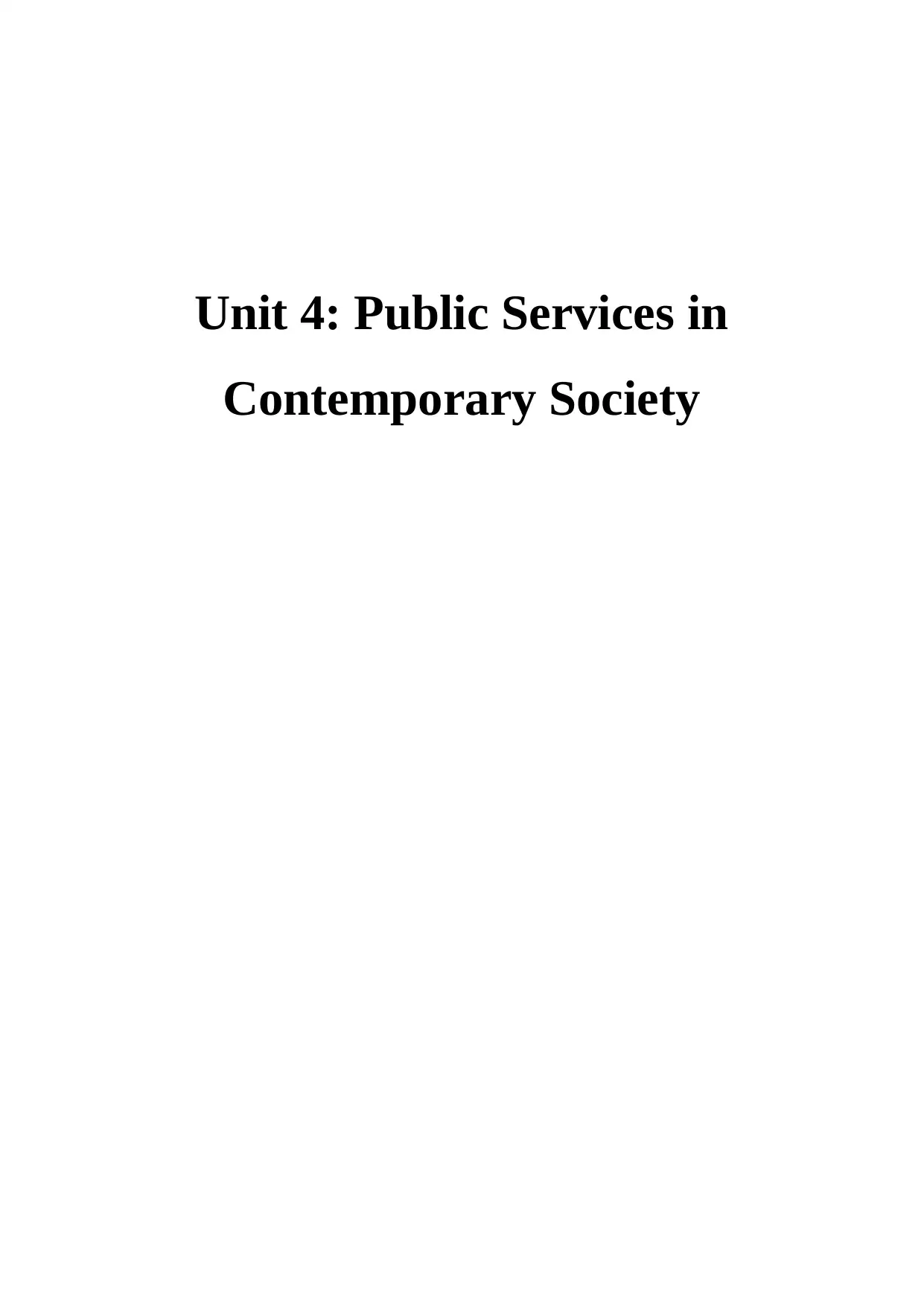
Unit 4: Public Services in
Contemporary Society
Contemporary Society
Secure Best Marks with AI Grader
Need help grading? Try our AI Grader for instant feedback on your assignments.
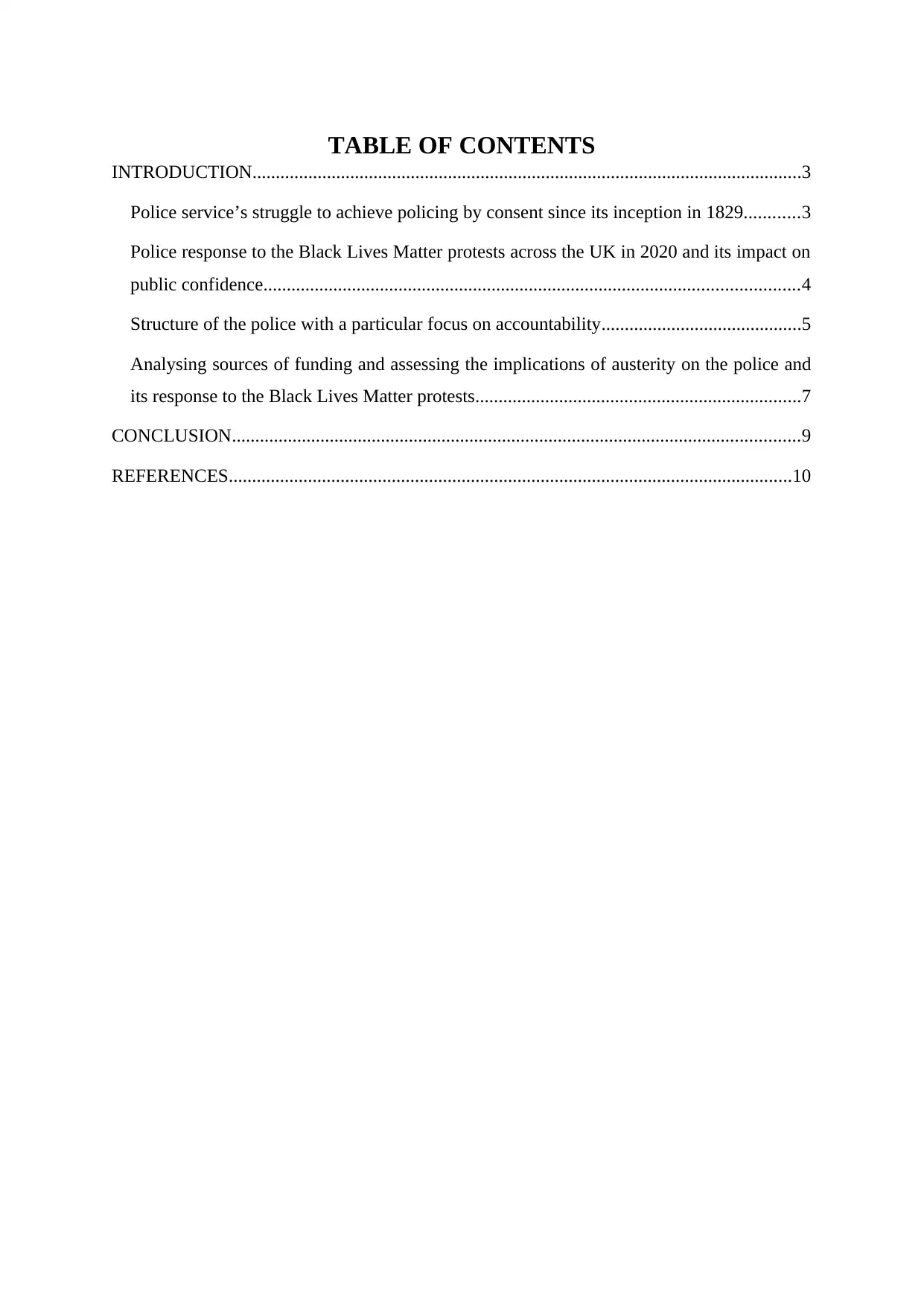
TABLE OF CONTENTS
INTRODUCTION......................................................................................................................3
Police service’s struggle to achieve policing by consent since its inception in 1829............3
Police response to the Black Lives Matter protests across the UK in 2020 and its impact on
public confidence...................................................................................................................4
Structure of the police with a particular focus on accountability...........................................5
Analysing sources of funding and assessing the implications of austerity on the police and
its response to the Black Lives Matter protests......................................................................7
CONCLUSION..........................................................................................................................9
REFERENCES.........................................................................................................................10
INTRODUCTION......................................................................................................................3
Police service’s struggle to achieve policing by consent since its inception in 1829............3
Police response to the Black Lives Matter protests across the UK in 2020 and its impact on
public confidence...................................................................................................................4
Structure of the police with a particular focus on accountability...........................................5
Analysing sources of funding and assessing the implications of austerity on the police and
its response to the Black Lives Matter protests......................................................................7
CONCLUSION..........................................................................................................................9
REFERENCES.........................................................................................................................10
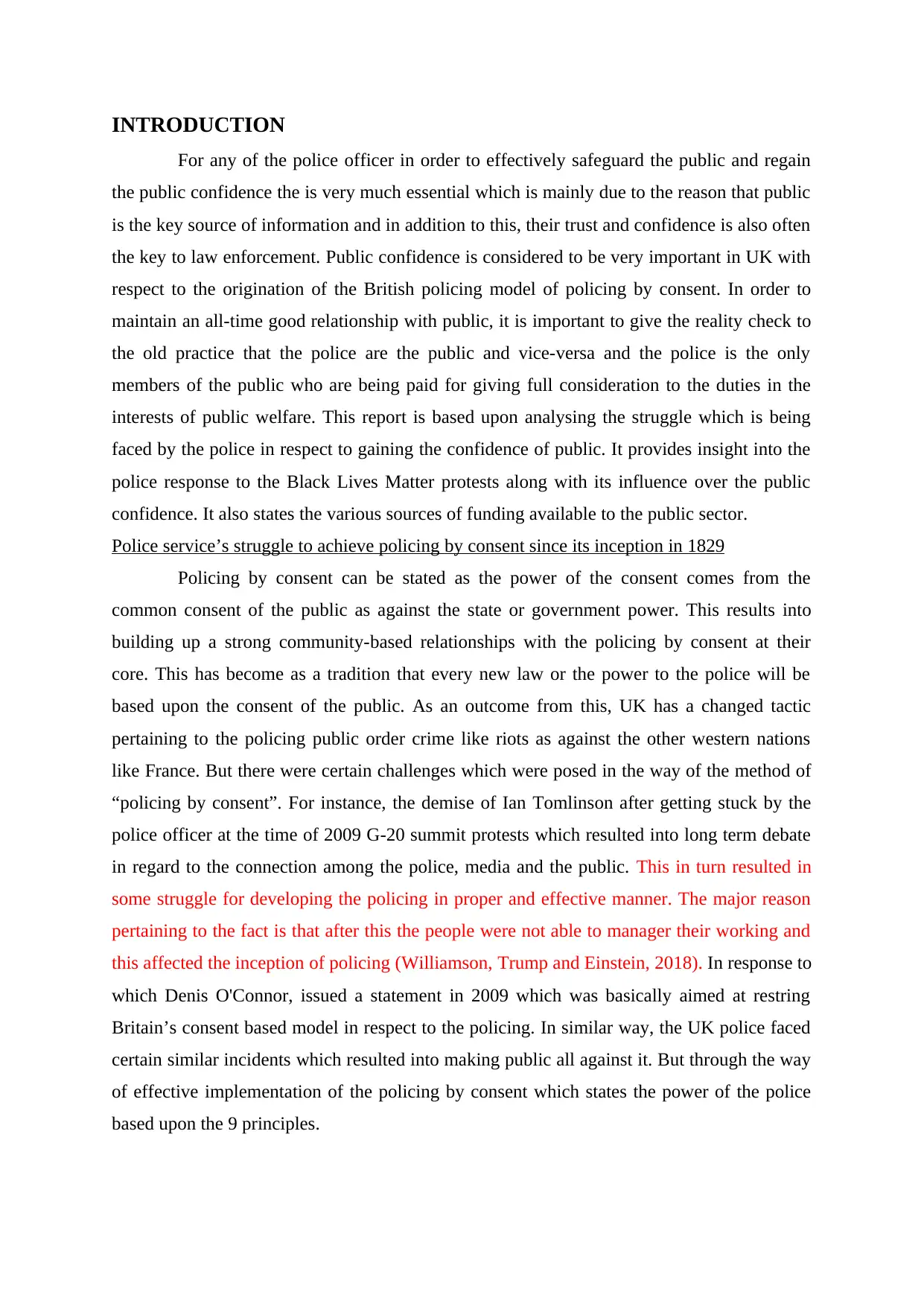
INTRODUCTION
For any of the police officer in order to effectively safeguard the public and regain
the public confidence the is very much essential which is mainly due to the reason that public
is the key source of information and in addition to this, their trust and confidence is also often
the key to law enforcement. Public confidence is considered to be very important in UK with
respect to the origination of the British policing model of policing by consent. In order to
maintain an all-time good relationship with public, it is important to give the reality check to
the old practice that the police are the public and vice-versa and the police is the only
members of the public who are being paid for giving full consideration to the duties in the
interests of public welfare. This report is based upon analysing the struggle which is being
faced by the police in respect to gaining the confidence of public. It provides insight into the
police response to the Black Lives Matter protests along with its influence over the public
confidence. It also states the various sources of funding available to the public sector.
Police service’s struggle to achieve policing by consent since its inception in 1829
Policing by consent can be stated as the power of the consent comes from the
common consent of the public as against the state or government power. This results into
building up a strong community-based relationships with the policing by consent at their
core. This has become as a tradition that every new law or the power to the police will be
based upon the consent of the public. As an outcome from this, UK has a changed tactic
pertaining to the policing public order crime like riots as against the other western nations
like France. But there were certain challenges which were posed in the way of the method of
“policing by consent”. For instance, the demise of Ian Tomlinson after getting stuck by the
police officer at the time of 2009 G-20 summit protests which resulted into long term debate
in regard to the connection among the police, media and the public. This in turn resulted in
some struggle for developing the policing in proper and effective manner. The major reason
pertaining to the fact is that after this the people were not able to manager their working and
this affected the inception of policing (Williamson, Trump and Einstein, 2018). In response to
which Denis O'Connor, issued a statement in 2009 which was basically aimed at restring
Britain’s consent based model in respect to the policing. In similar way, the UK police faced
certain similar incidents which resulted into making public all against it. But through the way
of effective implementation of the policing by consent which states the power of the police
based upon the 9 principles.
For any of the police officer in order to effectively safeguard the public and regain
the public confidence the is very much essential which is mainly due to the reason that public
is the key source of information and in addition to this, their trust and confidence is also often
the key to law enforcement. Public confidence is considered to be very important in UK with
respect to the origination of the British policing model of policing by consent. In order to
maintain an all-time good relationship with public, it is important to give the reality check to
the old practice that the police are the public and vice-versa and the police is the only
members of the public who are being paid for giving full consideration to the duties in the
interests of public welfare. This report is based upon analysing the struggle which is being
faced by the police in respect to gaining the confidence of public. It provides insight into the
police response to the Black Lives Matter protests along with its influence over the public
confidence. It also states the various sources of funding available to the public sector.
Police service’s struggle to achieve policing by consent since its inception in 1829
Policing by consent can be stated as the power of the consent comes from the
common consent of the public as against the state or government power. This results into
building up a strong community-based relationships with the policing by consent at their
core. This has become as a tradition that every new law or the power to the police will be
based upon the consent of the public. As an outcome from this, UK has a changed tactic
pertaining to the policing public order crime like riots as against the other western nations
like France. But there were certain challenges which were posed in the way of the method of
“policing by consent”. For instance, the demise of Ian Tomlinson after getting stuck by the
police officer at the time of 2009 G-20 summit protests which resulted into long term debate
in regard to the connection among the police, media and the public. This in turn resulted in
some struggle for developing the policing in proper and effective manner. The major reason
pertaining to the fact is that after this the people were not able to manager their working and
this affected the inception of policing (Williamson, Trump and Einstein, 2018). In response to
which Denis O'Connor, issued a statement in 2009 which was basically aimed at restring
Britain’s consent based model in respect to the policing. In similar way, the UK police faced
certain similar incidents which resulted into making public all against it. But through the way
of effective implementation of the policing by consent which states the power of the police
based upon the 9 principles.
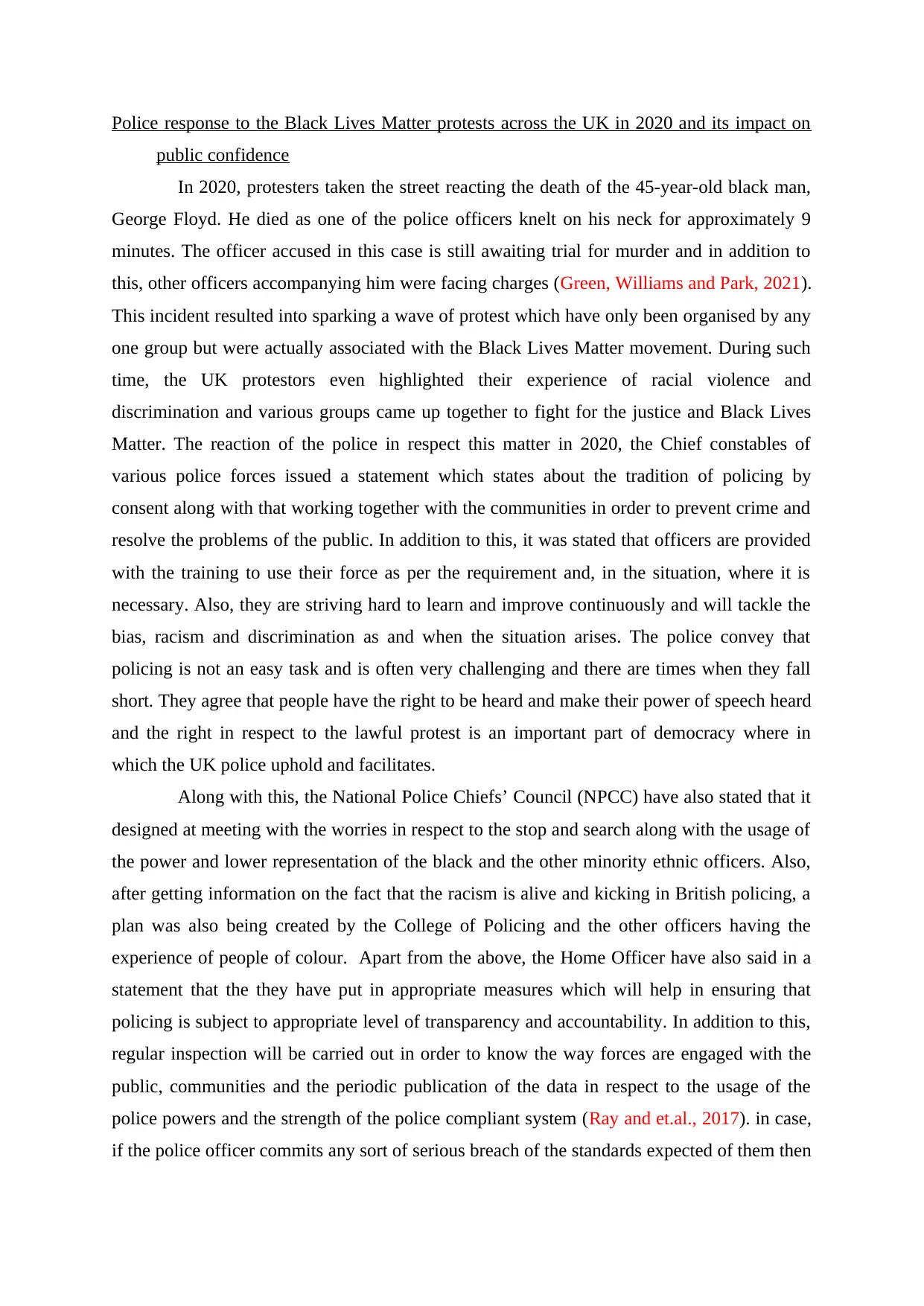
Police response to the Black Lives Matter protests across the UK in 2020 and its impact on
public confidence
In 2020, protesters taken the street reacting the death of the 45-year-old black man,
George Floyd. He died as one of the police officers knelt on his neck for approximately 9
minutes. The officer accused in this case is still awaiting trial for murder and in addition to
this, other officers accompanying him were facing charges (Green, Williams and Park, 2021).
This incident resulted into sparking a wave of protest which have only been organised by any
one group but were actually associated with the Black Lives Matter movement. During such
time, the UK protestors even highlighted their experience of racial violence and
discrimination and various groups came up together to fight for the justice and Black Lives
Matter. The reaction of the police in respect this matter in 2020, the Chief constables of
various police forces issued a statement which states about the tradition of policing by
consent along with that working together with the communities in order to prevent crime and
resolve the problems of the public. In addition to this, it was stated that officers are provided
with the training to use their force as per the requirement and, in the situation, where it is
necessary. Also, they are striving hard to learn and improve continuously and will tackle the
bias, racism and discrimination as and when the situation arises. The police convey that
policing is not an easy task and is often very challenging and there are times when they fall
short. They agree that people have the right to be heard and make their power of speech heard
and the right in respect to the lawful protest is an important part of democracy where in
which the UK police uphold and facilitates.
Along with this, the National Police Chiefs’ Council (NPCC) have also stated that it
designed at meeting with the worries in respect to the stop and search along with the usage of
the power and lower representation of the black and the other minority ethnic officers. Also,
after getting information on the fact that the racism is alive and kicking in British policing, a
plan was also being created by the College of Policing and the other officers having the
experience of people of colour. Apart from the above, the Home Officer have also said in a
statement that the they have put in appropriate measures which will help in ensuring that
policing is subject to appropriate level of transparency and accountability. In addition to this,
regular inspection will be carried out in order to know the way forces are engaged with the
public, communities and the periodic publication of the data in respect to the usage of the
police powers and the strength of the police compliant system (Ray and et.al., 2017). in case,
if the police officer commits any sort of serious breach of the standards expected of them then
public confidence
In 2020, protesters taken the street reacting the death of the 45-year-old black man,
George Floyd. He died as one of the police officers knelt on his neck for approximately 9
minutes. The officer accused in this case is still awaiting trial for murder and in addition to
this, other officers accompanying him were facing charges (Green, Williams and Park, 2021).
This incident resulted into sparking a wave of protest which have only been organised by any
one group but were actually associated with the Black Lives Matter movement. During such
time, the UK protestors even highlighted their experience of racial violence and
discrimination and various groups came up together to fight for the justice and Black Lives
Matter. The reaction of the police in respect this matter in 2020, the Chief constables of
various police forces issued a statement which states about the tradition of policing by
consent along with that working together with the communities in order to prevent crime and
resolve the problems of the public. In addition to this, it was stated that officers are provided
with the training to use their force as per the requirement and, in the situation, where it is
necessary. Also, they are striving hard to learn and improve continuously and will tackle the
bias, racism and discrimination as and when the situation arises. The police convey that
policing is not an easy task and is often very challenging and there are times when they fall
short. They agree that people have the right to be heard and make their power of speech heard
and the right in respect to the lawful protest is an important part of democracy where in
which the UK police uphold and facilitates.
Along with this, the National Police Chiefs’ Council (NPCC) have also stated that it
designed at meeting with the worries in respect to the stop and search along with the usage of
the power and lower representation of the black and the other minority ethnic officers. Also,
after getting information on the fact that the racism is alive and kicking in British policing, a
plan was also being created by the College of Policing and the other officers having the
experience of people of colour. Apart from the above, the Home Officer have also said in a
statement that the they have put in appropriate measures which will help in ensuring that
policing is subject to appropriate level of transparency and accountability. In addition to this,
regular inspection will be carried out in order to know the way forces are engaged with the
public, communities and the periodic publication of the data in respect to the usage of the
police powers and the strength of the police compliant system (Ray and et.al., 2017). in case,
if the police officer commits any sort of serious breach of the standards expected of them then
Secure Best Marks with AI Grader
Need help grading? Try our AI Grader for instant feedback on your assignments.
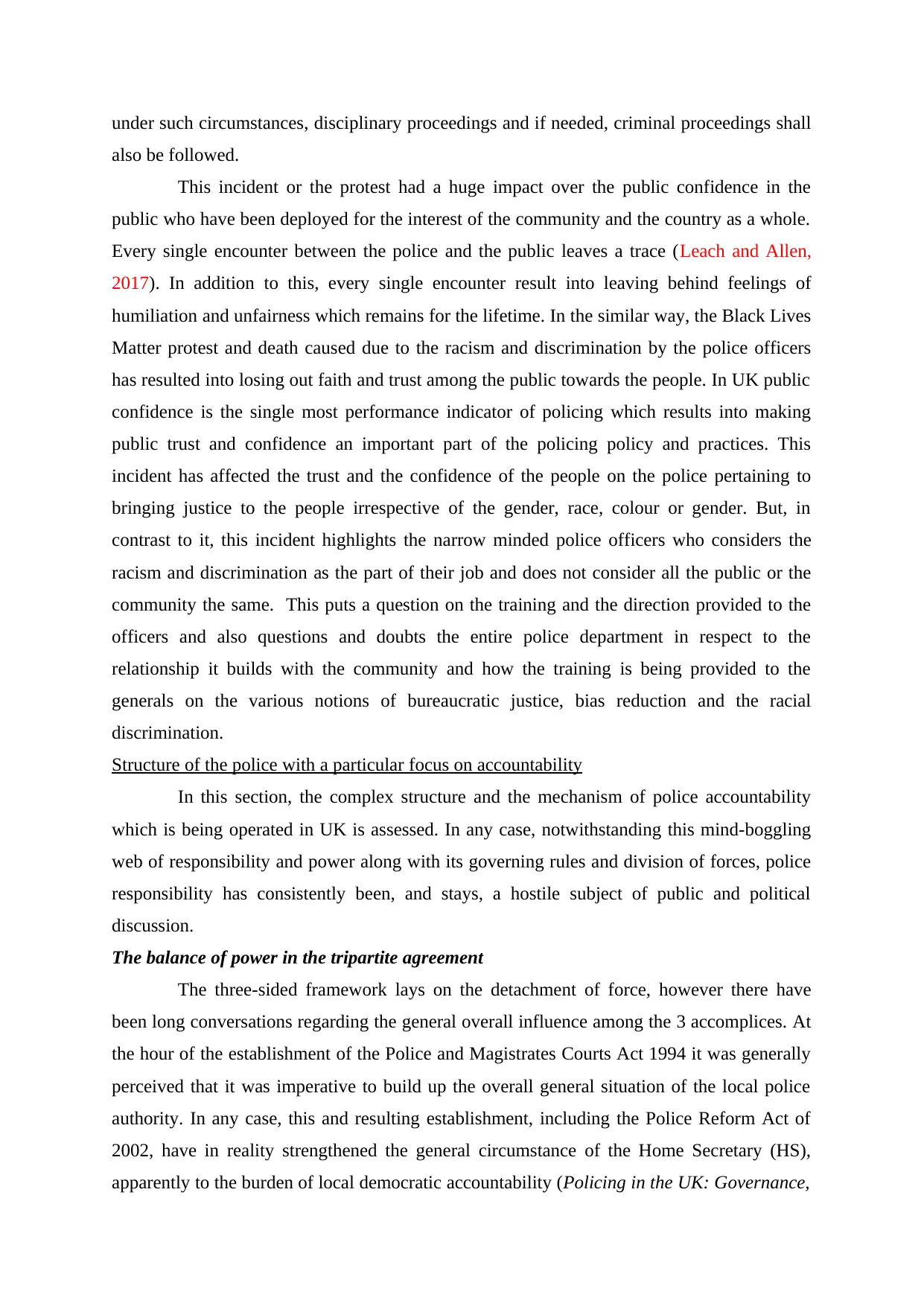
under such circumstances, disciplinary proceedings and if needed, criminal proceedings shall
also be followed.
This incident or the protest had a huge impact over the public confidence in the
public who have been deployed for the interest of the community and the country as a whole.
Every single encounter between the police and the public leaves a trace (Leach and Allen,
2017). In addition to this, every single encounter result into leaving behind feelings of
humiliation and unfairness which remains for the lifetime. In the similar way, the Black Lives
Matter protest and death caused due to the racism and discrimination by the police officers
has resulted into losing out faith and trust among the public towards the people. In UK public
confidence is the single most performance indicator of policing which results into making
public trust and confidence an important part of the policing policy and practices. This
incident has affected the trust and the confidence of the people on the police pertaining to
bringing justice to the people irrespective of the gender, race, colour or gender. But, in
contrast to it, this incident highlights the narrow minded police officers who considers the
racism and discrimination as the part of their job and does not consider all the public or the
community the same. This puts a question on the training and the direction provided to the
officers and also questions and doubts the entire police department in respect to the
relationship it builds with the community and how the training is being provided to the
generals on the various notions of bureaucratic justice, bias reduction and the racial
discrimination.
Structure of the police with a particular focus on accountability
In this section, the complex structure and the mechanism of police accountability
which is being operated in UK is assessed. In any case, notwithstanding this mind-boggling
web of responsibility and power along with its governing rules and division of forces, police
responsibility has consistently been, and stays, a hostile subject of public and political
discussion.
The balance of power in the tripartite agreement
The three-sided framework lays on the detachment of force, however there have
been long conversations regarding the general overall influence among the 3 accomplices. At
the hour of the establishment of the Police and Magistrates Courts Act 1994 it was generally
perceived that it was imperative to build up the overall general situation of the local police
authority. In any case, this and resulting establishment, including the Police Reform Act of
2002, have in reality strengthened the general circumstance of the Home Secretary (HS),
apparently to the burden of local democratic accountability (Policing in the UK: Governance,
also be followed.
This incident or the protest had a huge impact over the public confidence in the
public who have been deployed for the interest of the community and the country as a whole.
Every single encounter between the police and the public leaves a trace (Leach and Allen,
2017). In addition to this, every single encounter result into leaving behind feelings of
humiliation and unfairness which remains for the lifetime. In the similar way, the Black Lives
Matter protest and death caused due to the racism and discrimination by the police officers
has resulted into losing out faith and trust among the public towards the people. In UK public
confidence is the single most performance indicator of policing which results into making
public trust and confidence an important part of the policing policy and practices. This
incident has affected the trust and the confidence of the people on the police pertaining to
bringing justice to the people irrespective of the gender, race, colour or gender. But, in
contrast to it, this incident highlights the narrow minded police officers who considers the
racism and discrimination as the part of their job and does not consider all the public or the
community the same. This puts a question on the training and the direction provided to the
officers and also questions and doubts the entire police department in respect to the
relationship it builds with the community and how the training is being provided to the
generals on the various notions of bureaucratic justice, bias reduction and the racial
discrimination.
Structure of the police with a particular focus on accountability
In this section, the complex structure and the mechanism of police accountability
which is being operated in UK is assessed. In any case, notwithstanding this mind-boggling
web of responsibility and power along with its governing rules and division of forces, police
responsibility has consistently been, and stays, a hostile subject of public and political
discussion.
The balance of power in the tripartite agreement
The three-sided framework lays on the detachment of force, however there have
been long conversations regarding the general overall influence among the 3 accomplices. At
the hour of the establishment of the Police and Magistrates Courts Act 1994 it was generally
perceived that it was imperative to build up the overall general situation of the local police
authority. In any case, this and resulting establishment, including the Police Reform Act of
2002, have in reality strengthened the general circumstance of the Home Secretary (HS),
apparently to the burden of local democratic accountability (Policing in the UK: Governance,
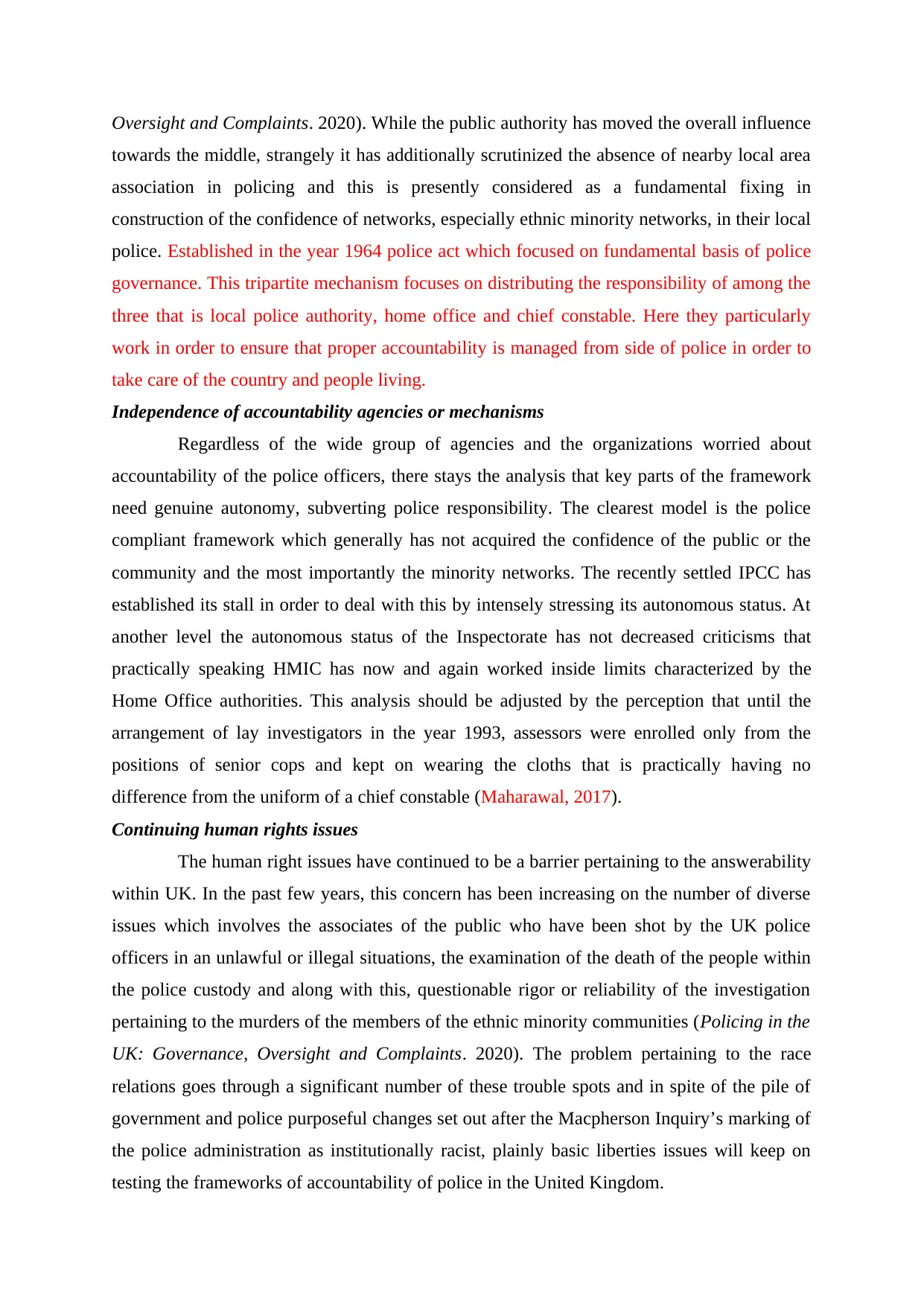
Oversight and Complaints. 2020). While the public authority has moved the overall influence
towards the middle, strangely it has additionally scrutinized the absence of nearby local area
association in policing and this is presently considered as a fundamental fixing in
construction of the confidence of networks, especially ethnic minority networks, in their local
police. Established in the year 1964 police act which focused on fundamental basis of police
governance. This tripartite mechanism focuses on distributing the responsibility of among the
three that is local police authority, home office and chief constable. Here they particularly
work in order to ensure that proper accountability is managed from side of police in order to
take care of the country and people living.
Independence of accountability agencies or mechanisms
Regardless of the wide group of agencies and the organizations worried about
accountability of the police officers, there stays the analysis that key parts of the framework
need genuine autonomy, subverting police responsibility. The clearest model is the police
compliant framework which generally has not acquired the confidence of the public or the
community and the most importantly the minority networks. The recently settled IPCC has
established its stall in order to deal with this by intensely stressing its autonomous status. At
another level the autonomous status of the Inspectorate has not decreased criticisms that
practically speaking HMIC has now and again worked inside limits characterized by the
Home Office authorities. This analysis should be adjusted by the perception that until the
arrangement of lay investigators in the year 1993, assessors were enrolled only from the
positions of senior cops and kept on wearing the cloths that is practically having no
difference from the uniform of a chief constable (Maharawal, 2017).
Continuing human rights issues
The human right issues have continued to be a barrier pertaining to the answerability
within UK. In the past few years, this concern has been increasing on the number of diverse
issues which involves the associates of the public who have been shot by the UK police
officers in an unlawful or illegal situations, the examination of the death of the people within
the police custody and along with this, questionable rigor or reliability of the investigation
pertaining to the murders of the members of the ethnic minority communities (Policing in the
UK: Governance, Oversight and Complaints. 2020). The problem pertaining to the race
relations goes through a significant number of these trouble spots and in spite of the pile of
government and police purposeful changes set out after the Macpherson Inquiry’s marking of
the police administration as institutionally racist, plainly basic liberties issues will keep on
testing the frameworks of accountability of police in the United Kingdom.
towards the middle, strangely it has additionally scrutinized the absence of nearby local area
association in policing and this is presently considered as a fundamental fixing in
construction of the confidence of networks, especially ethnic minority networks, in their local
police. Established in the year 1964 police act which focused on fundamental basis of police
governance. This tripartite mechanism focuses on distributing the responsibility of among the
three that is local police authority, home office and chief constable. Here they particularly
work in order to ensure that proper accountability is managed from side of police in order to
take care of the country and people living.
Independence of accountability agencies or mechanisms
Regardless of the wide group of agencies and the organizations worried about
accountability of the police officers, there stays the analysis that key parts of the framework
need genuine autonomy, subverting police responsibility. The clearest model is the police
compliant framework which generally has not acquired the confidence of the public or the
community and the most importantly the minority networks. The recently settled IPCC has
established its stall in order to deal with this by intensely stressing its autonomous status. At
another level the autonomous status of the Inspectorate has not decreased criticisms that
practically speaking HMIC has now and again worked inside limits characterized by the
Home Office authorities. This analysis should be adjusted by the perception that until the
arrangement of lay investigators in the year 1993, assessors were enrolled only from the
positions of senior cops and kept on wearing the cloths that is practically having no
difference from the uniform of a chief constable (Maharawal, 2017).
Continuing human rights issues
The human right issues have continued to be a barrier pertaining to the answerability
within UK. In the past few years, this concern has been increasing on the number of diverse
issues which involves the associates of the public who have been shot by the UK police
officers in an unlawful or illegal situations, the examination of the death of the people within
the police custody and along with this, questionable rigor or reliability of the investigation
pertaining to the murders of the members of the ethnic minority communities (Policing in the
UK: Governance, Oversight and Complaints. 2020). The problem pertaining to the race
relations goes through a significant number of these trouble spots and in spite of the pile of
government and police purposeful changes set out after the Macpherson Inquiry’s marking of
the police administration as institutionally racist, plainly basic liberties issues will keep on
testing the frameworks of accountability of police in the United Kingdom.
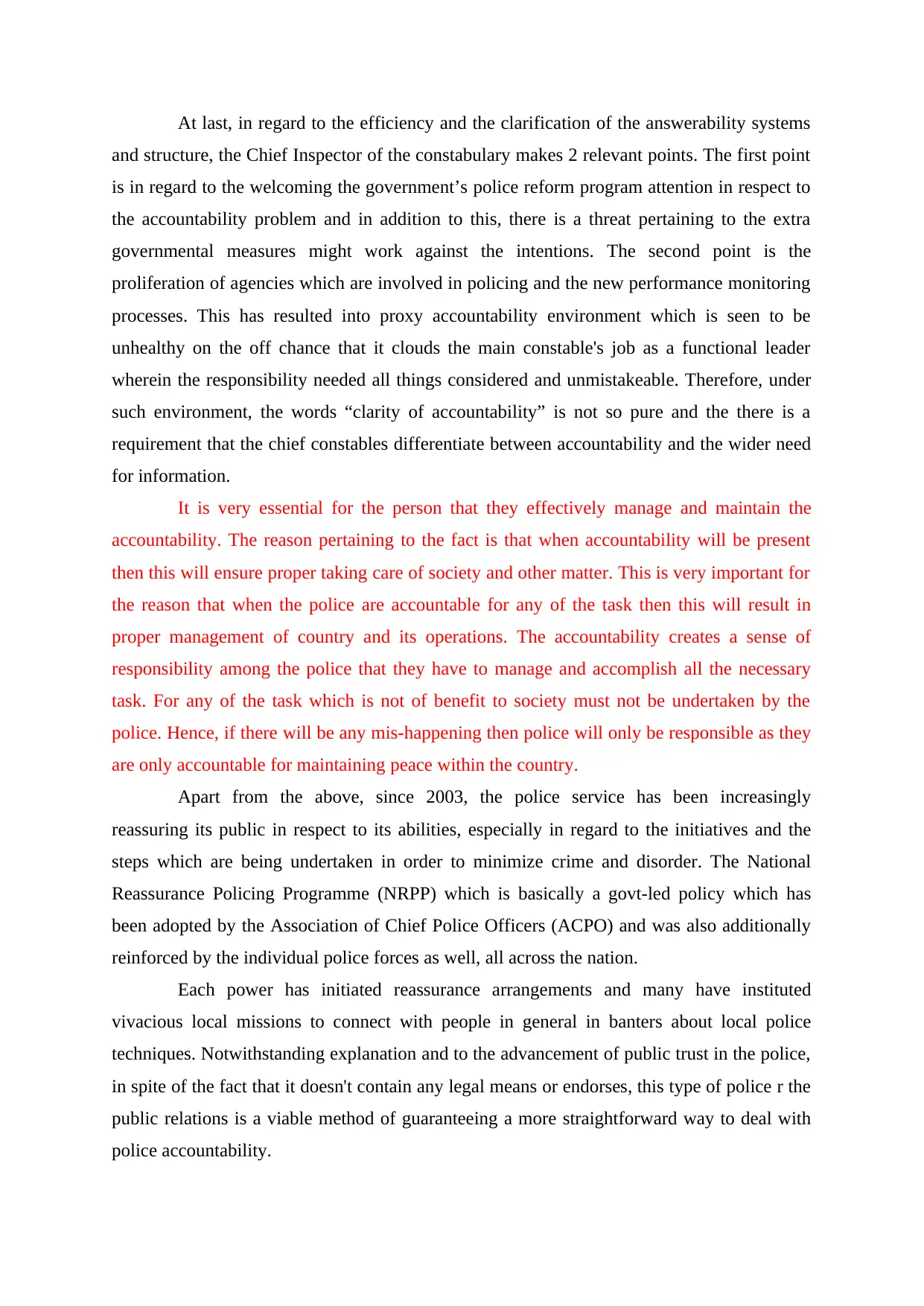
At last, in regard to the efficiency and the clarification of the answerability systems
and structure, the Chief Inspector of the constabulary makes 2 relevant points. The first point
is in regard to the welcoming the government’s police reform program attention in respect to
the accountability problem and in addition to this, there is a threat pertaining to the extra
governmental measures might work against the intentions. The second point is the
proliferation of agencies which are involved in policing and the new performance monitoring
processes. This has resulted into proxy accountability environment which is seen to be
unhealthy on the off chance that it clouds the main constable's job as a functional leader
wherein the responsibility needed all things considered and unmistakeable. Therefore, under
such environment, the words “clarity of accountability” is not so pure and the there is a
requirement that the chief constables differentiate between accountability and the wider need
for information.
It is very essential for the person that they effectively manage and maintain the
accountability. The reason pertaining to the fact is that when accountability will be present
then this will ensure proper taking care of society and other matter. This is very important for
the reason that when the police are accountable for any of the task then this will result in
proper management of country and its operations. The accountability creates a sense of
responsibility among the police that they have to manage and accomplish all the necessary
task. For any of the task which is not of benefit to society must not be undertaken by the
police. Hence, if there will be any mis-happening then police will only be responsible as they
are only accountable for maintaining peace within the country.
Apart from the above, since 2003, the police service has been increasingly
reassuring its public in respect to its abilities, especially in regard to the initiatives and the
steps which are being undertaken in order to minimize crime and disorder. The National
Reassurance Policing Programme (NRPP) which is basically a govt-led policy which has
been adopted by the Association of Chief Police Officers (ACPO) and was also additionally
reinforced by the individual police forces as well, all across the nation.
Each power has initiated reassurance arrangements and many have instituted
vivacious local missions to connect with people in general in banters about local police
techniques. Notwithstanding explanation and to the advancement of public trust in the police,
in spite of the fact that it doesn't contain any legal means or endorses, this type of police r the
public relations is a viable method of guaranteeing a more straightforward way to deal with
police accountability.
and structure, the Chief Inspector of the constabulary makes 2 relevant points. The first point
is in regard to the welcoming the government’s police reform program attention in respect to
the accountability problem and in addition to this, there is a threat pertaining to the extra
governmental measures might work against the intentions. The second point is the
proliferation of agencies which are involved in policing and the new performance monitoring
processes. This has resulted into proxy accountability environment which is seen to be
unhealthy on the off chance that it clouds the main constable's job as a functional leader
wherein the responsibility needed all things considered and unmistakeable. Therefore, under
such environment, the words “clarity of accountability” is not so pure and the there is a
requirement that the chief constables differentiate between accountability and the wider need
for information.
It is very essential for the person that they effectively manage and maintain the
accountability. The reason pertaining to the fact is that when accountability will be present
then this will ensure proper taking care of society and other matter. This is very important for
the reason that when the police are accountable for any of the task then this will result in
proper management of country and its operations. The accountability creates a sense of
responsibility among the police that they have to manage and accomplish all the necessary
task. For any of the task which is not of benefit to society must not be undertaken by the
police. Hence, if there will be any mis-happening then police will only be responsible as they
are only accountable for maintaining peace within the country.
Apart from the above, since 2003, the police service has been increasingly
reassuring its public in respect to its abilities, especially in regard to the initiatives and the
steps which are being undertaken in order to minimize crime and disorder. The National
Reassurance Policing Programme (NRPP) which is basically a govt-led policy which has
been adopted by the Association of Chief Police Officers (ACPO) and was also additionally
reinforced by the individual police forces as well, all across the nation.
Each power has initiated reassurance arrangements and many have instituted
vivacious local missions to connect with people in general in banters about local police
techniques. Notwithstanding explanation and to the advancement of public trust in the police,
in spite of the fact that it doesn't contain any legal means or endorses, this type of police r the
public relations is a viable method of guaranteeing a more straightforward way to deal with
police accountability.
Paraphrase This Document
Need a fresh take? Get an instant paraphrase of this document with our AI Paraphraser
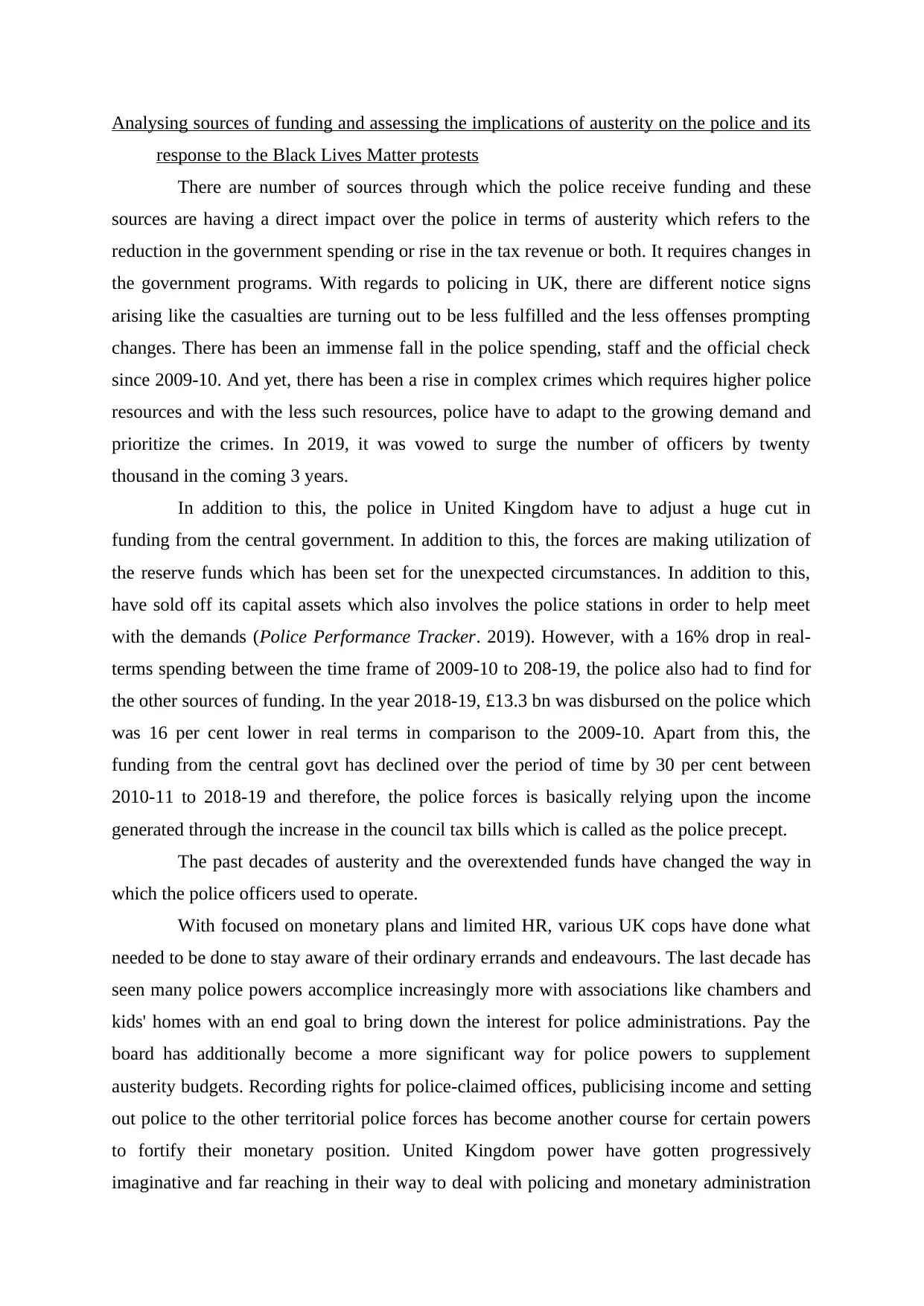
Analysing sources of funding and assessing the implications of austerity on the police and its
response to the Black Lives Matter protests
There are number of sources through which the police receive funding and these
sources are having a direct impact over the police in terms of austerity which refers to the
reduction in the government spending or rise in the tax revenue or both. It requires changes in
the government programs. With regards to policing in UK, there are different notice signs
arising like the casualties are turning out to be less fulfilled and the less offenses prompting
changes. There has been an immense fall in the police spending, staff and the official check
since 2009-10. And yet, there has been a rise in complex crimes which requires higher police
resources and with the less such resources, police have to adapt to the growing demand and
prioritize the crimes. In 2019, it was vowed to surge the number of officers by twenty
thousand in the coming 3 years.
In addition to this, the police in United Kingdom have to adjust a huge cut in
funding from the central government. In addition to this, the forces are making utilization of
the reserve funds which has been set for the unexpected circumstances. In addition to this,
have sold off its capital assets which also involves the police stations in order to help meet
with the demands (Police Performance Tracker. 2019). However, with a 16% drop in real-
terms spending between the time frame of 2009-10 to 208-19, the police also had to find for
the other sources of funding. In the year 2018-19, £13.3 bn was disbursed on the police which
was 16 per cent lower in real terms in comparison to the 2009-10. Apart from this, the
funding from the central govt has declined over the period of time by 30 per cent between
2010-11 to 2018-19 and therefore, the police forces is basically relying upon the income
generated through the increase in the council tax bills which is called as the police precept.
The past decades of austerity and the overextended funds have changed the way in
which the police officers used to operate.
With focused on monetary plans and limited HR, various UK cops have done what
needed to be done to stay aware of their ordinary errands and endeavours. The last decade has
seen many police powers accomplice increasingly more with associations like chambers and
kids' homes with an end goal to bring down the interest for police administrations. Pay the
board has additionally become a more significant way for police powers to supplement
austerity budgets. Recording rights for police-claimed offices, publicising income and setting
out police to the other territorial police forces has become another course for certain powers
to fortify their monetary position. United Kingdom power have gotten progressively
imaginative and far reaching in their way to deal with policing and monetary administration
response to the Black Lives Matter protests
There are number of sources through which the police receive funding and these
sources are having a direct impact over the police in terms of austerity which refers to the
reduction in the government spending or rise in the tax revenue or both. It requires changes in
the government programs. With regards to policing in UK, there are different notice signs
arising like the casualties are turning out to be less fulfilled and the less offenses prompting
changes. There has been an immense fall in the police spending, staff and the official check
since 2009-10. And yet, there has been a rise in complex crimes which requires higher police
resources and with the less such resources, police have to adapt to the growing demand and
prioritize the crimes. In 2019, it was vowed to surge the number of officers by twenty
thousand in the coming 3 years.
In addition to this, the police in United Kingdom have to adjust a huge cut in
funding from the central government. In addition to this, the forces are making utilization of
the reserve funds which has been set for the unexpected circumstances. In addition to this,
have sold off its capital assets which also involves the police stations in order to help meet
with the demands (Police Performance Tracker. 2019). However, with a 16% drop in real-
terms spending between the time frame of 2009-10 to 208-19, the police also had to find for
the other sources of funding. In the year 2018-19, £13.3 bn was disbursed on the police which
was 16 per cent lower in real terms in comparison to the 2009-10. Apart from this, the
funding from the central govt has declined over the period of time by 30 per cent between
2010-11 to 2018-19 and therefore, the police forces is basically relying upon the income
generated through the increase in the council tax bills which is called as the police precept.
The past decades of austerity and the overextended funds have changed the way in
which the police officers used to operate.
With focused on monetary plans and limited HR, various UK cops have done what
needed to be done to stay aware of their ordinary errands and endeavours. The last decade has
seen many police powers accomplice increasingly more with associations like chambers and
kids' homes with an end goal to bring down the interest for police administrations. Pay the
board has additionally become a more significant way for police powers to supplement
austerity budgets. Recording rights for police-claimed offices, publicising income and setting
out police to the other territorial police forces has become another course for certain powers
to fortify their monetary position. United Kingdom power have gotten progressively
imaginative and far reaching in their way to deal with policing and monetary administration
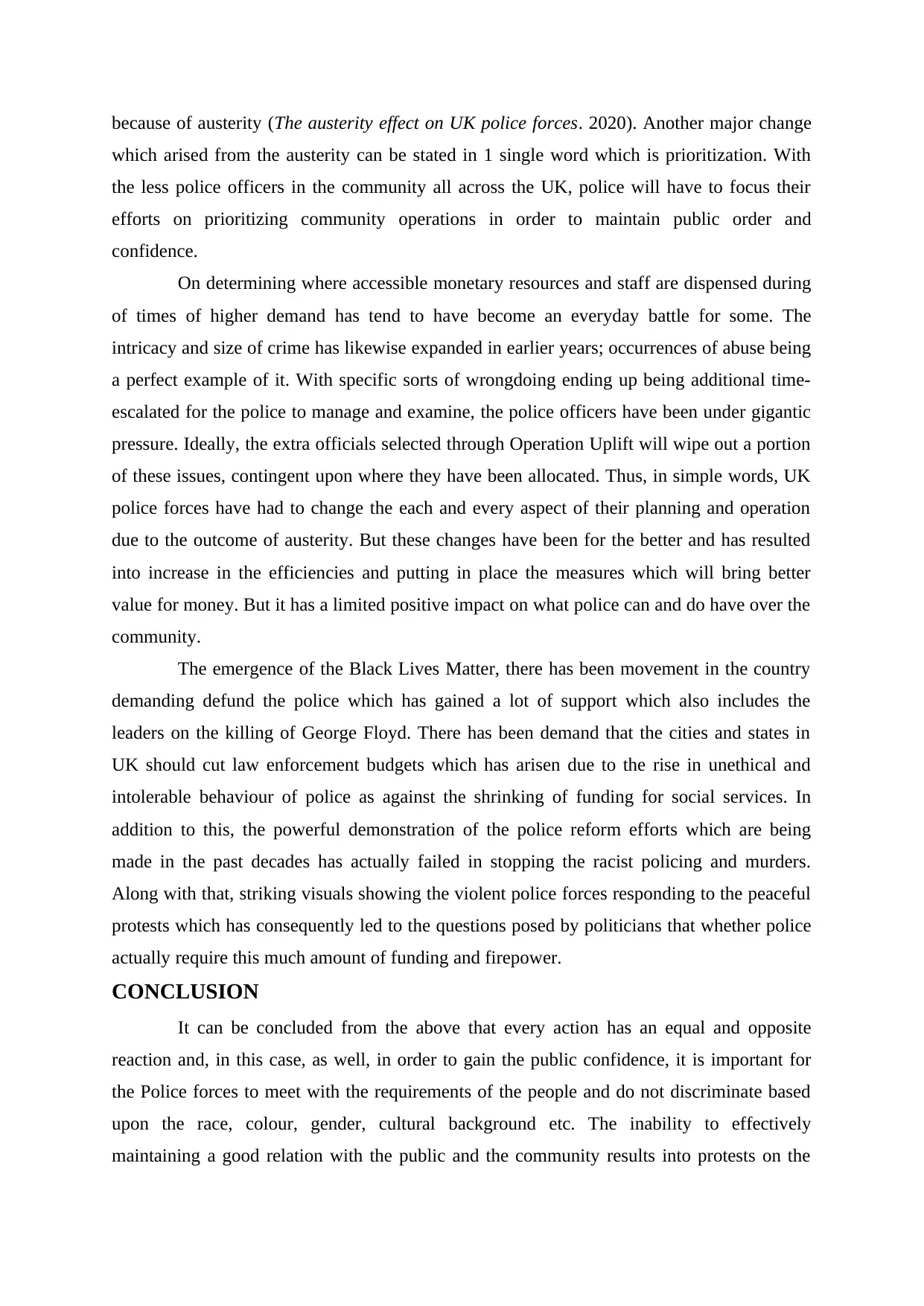
because of austerity (The austerity effect on UK police forces. 2020). Another major change
which arised from the austerity can be stated in 1 single word which is prioritization. With
the less police officers in the community all across the UK, police will have to focus their
efforts on prioritizing community operations in order to maintain public order and
confidence.
On determining where accessible monetary resources and staff are dispensed during
of times of higher demand has tend to have become an everyday battle for some. The
intricacy and size of crime has likewise expanded in earlier years; occurrences of abuse being
a perfect example of it. With specific sorts of wrongdoing ending up being additional time-
escalated for the police to manage and examine, the police officers have been under gigantic
pressure. Ideally, the extra officials selected through Operation Uplift will wipe out a portion
of these issues, contingent upon where they have been allocated. Thus, in simple words, UK
police forces have had to change the each and every aspect of their planning and operation
due to the outcome of austerity. But these changes have been for the better and has resulted
into increase in the efficiencies and putting in place the measures which will bring better
value for money. But it has a limited positive impact on what police can and do have over the
community.
The emergence of the Black Lives Matter, there has been movement in the country
demanding defund the police which has gained a lot of support which also includes the
leaders on the killing of George Floyd. There has been demand that the cities and states in
UK should cut law enforcement budgets which has arisen due to the rise in unethical and
intolerable behaviour of police as against the shrinking of funding for social services. In
addition to this, the powerful demonstration of the police reform efforts which are being
made in the past decades has actually failed in stopping the racist policing and murders.
Along with that, striking visuals showing the violent police forces responding to the peaceful
protests which has consequently led to the questions posed by politicians that whether police
actually require this much amount of funding and firepower.
CONCLUSION
It can be concluded from the above that every action has an equal and opposite
reaction and, in this case, as well, in order to gain the public confidence, it is important for
the Police forces to meet with the requirements of the people and do not discriminate based
upon the race, colour, gender, cultural background etc. The inability to effectively
maintaining a good relation with the public and the community results into protests on the
which arised from the austerity can be stated in 1 single word which is prioritization. With
the less police officers in the community all across the UK, police will have to focus their
efforts on prioritizing community operations in order to maintain public order and
confidence.
On determining where accessible monetary resources and staff are dispensed during
of times of higher demand has tend to have become an everyday battle for some. The
intricacy and size of crime has likewise expanded in earlier years; occurrences of abuse being
a perfect example of it. With specific sorts of wrongdoing ending up being additional time-
escalated for the police to manage and examine, the police officers have been under gigantic
pressure. Ideally, the extra officials selected through Operation Uplift will wipe out a portion
of these issues, contingent upon where they have been allocated. Thus, in simple words, UK
police forces have had to change the each and every aspect of their planning and operation
due to the outcome of austerity. But these changes have been for the better and has resulted
into increase in the efficiencies and putting in place the measures which will bring better
value for money. But it has a limited positive impact on what police can and do have over the
community.
The emergence of the Black Lives Matter, there has been movement in the country
demanding defund the police which has gained a lot of support which also includes the
leaders on the killing of George Floyd. There has been demand that the cities and states in
UK should cut law enforcement budgets which has arisen due to the rise in unethical and
intolerable behaviour of police as against the shrinking of funding for social services. In
addition to this, the powerful demonstration of the police reform efforts which are being
made in the past decades has actually failed in stopping the racist policing and murders.
Along with that, striking visuals showing the violent police forces responding to the peaceful
protests which has consequently led to the questions posed by politicians that whether police
actually require this much amount of funding and firepower.
CONCLUSION
It can be concluded from the above that every action has an equal and opposite
reaction and, in this case, as well, in order to gain the public confidence, it is important for
the Police forces to meet with the requirements of the people and do not discriminate based
upon the race, colour, gender, cultural background etc. The inability to effectively
maintaining a good relation with the public and the community results into protests on the
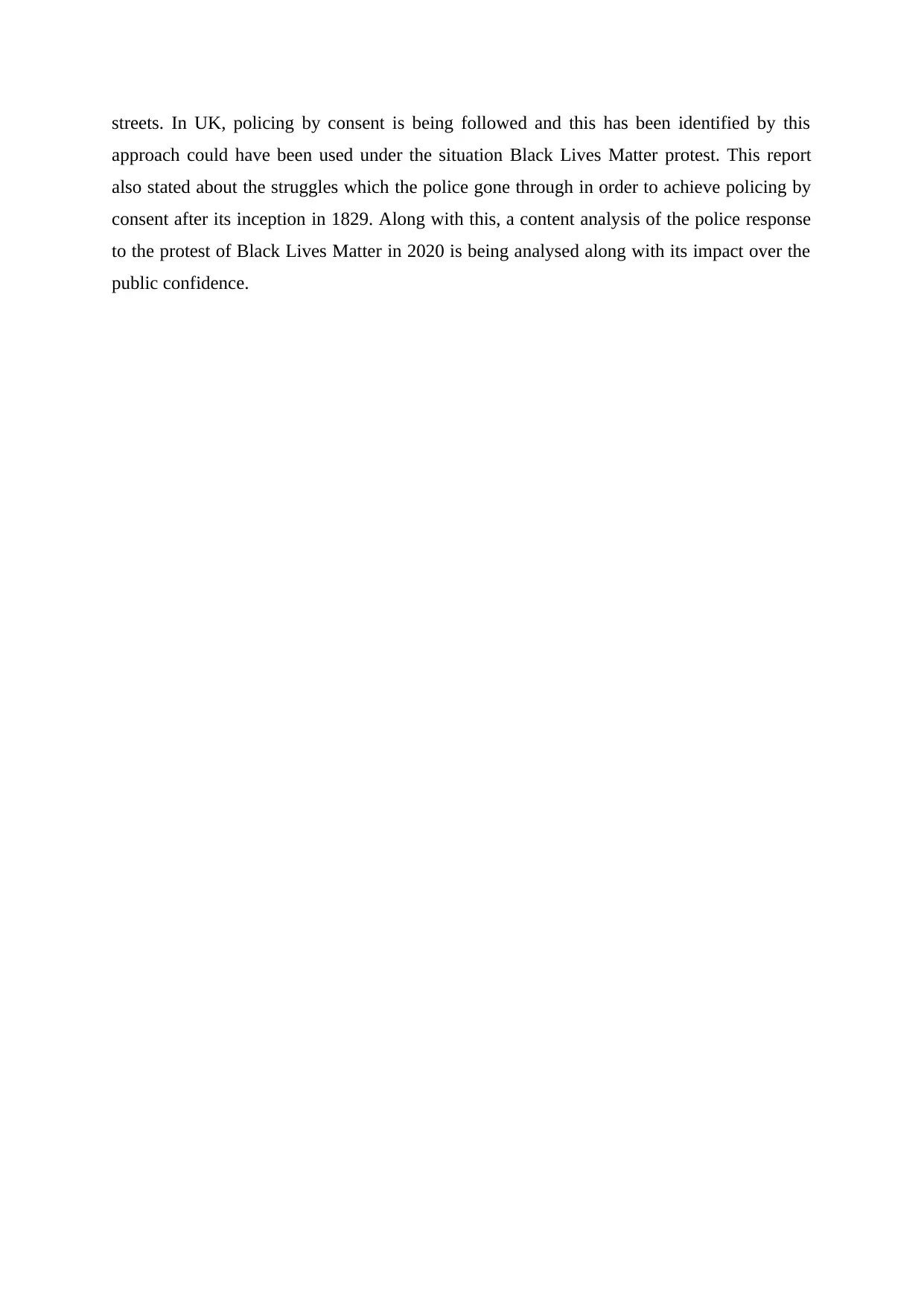
streets. In UK, policing by consent is being followed and this has been identified by this
approach could have been used under the situation Black Lives Matter protest. This report
also stated about the struggles which the police gone through in order to achieve policing by
consent after its inception in 1829. Along with this, a content analysis of the police response
to the protest of Black Lives Matter in 2020 is being analysed along with its impact over the
public confidence.
approach could have been used under the situation Black Lives Matter protest. This report
also stated about the struggles which the police gone through in order to achieve policing by
consent after its inception in 1829. Along with this, a content analysis of the police response
to the protest of Black Lives Matter in 2020 is being analysed along with its impact over the
public confidence.
Secure Best Marks with AI Grader
Need help grading? Try our AI Grader for instant feedback on your assignments.
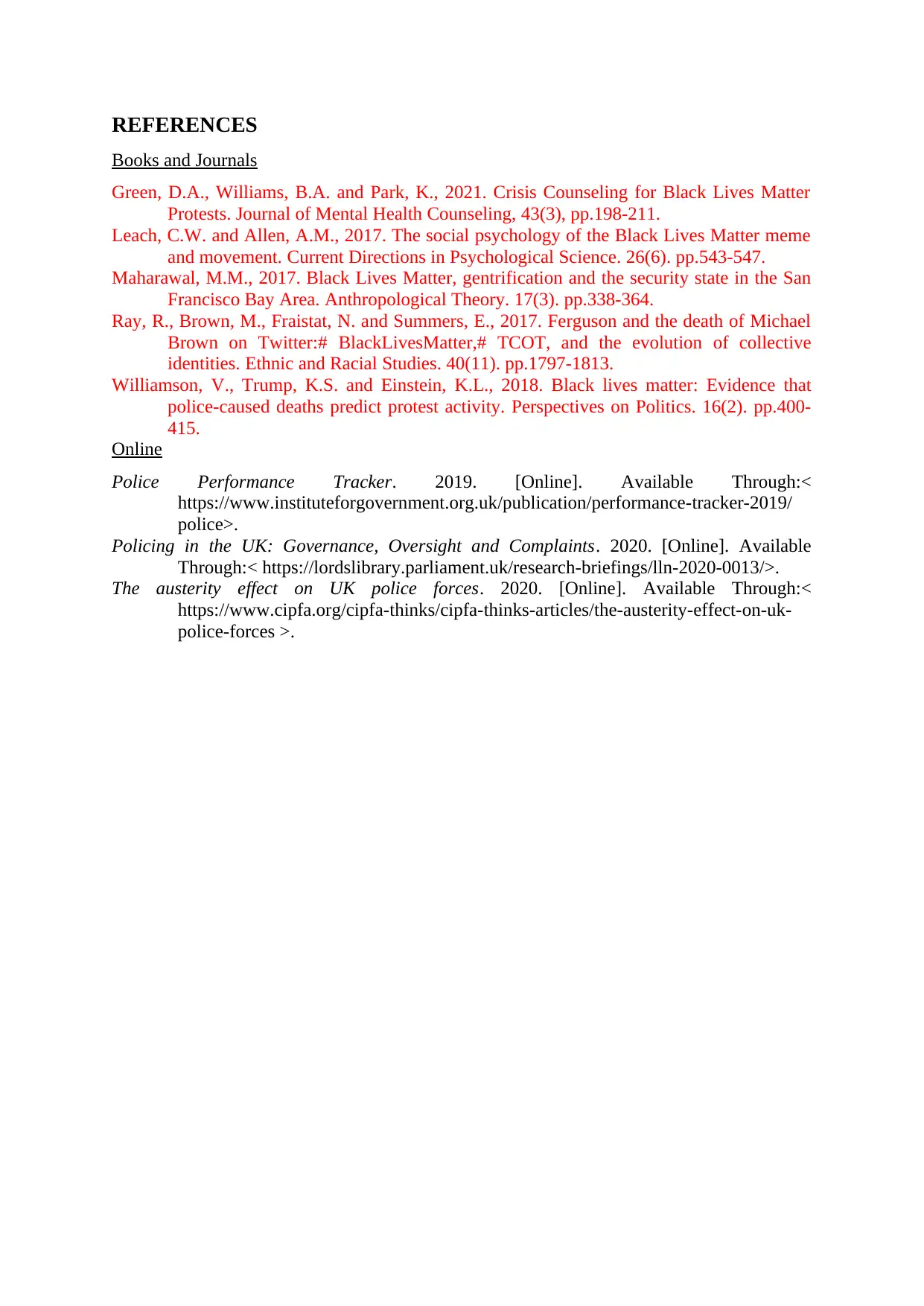
REFERENCES
Books and Journals
Green, D.A., Williams, B.A. and Park, K., 2021. Crisis Counseling for Black Lives Matter
Protests. Journal of Mental Health Counseling, 43(3), pp.198-211.
Leach, C.W. and Allen, A.M., 2017. The social psychology of the Black Lives Matter meme
and movement. Current Directions in Psychological Science. 26(6). pp.543-547.
Maharawal, M.M., 2017. Black Lives Matter, gentrification and the security state in the San
Francisco Bay Area. Anthropological Theory. 17(3). pp.338-364.
Ray, R., Brown, M., Fraistat, N. and Summers, E., 2017. Ferguson and the death of Michael
Brown on Twitter:# BlackLivesMatter,# TCOT, and the evolution of collective
identities. Ethnic and Racial Studies. 40(11). pp.1797-1813.
Williamson, V., Trump, K.S. and Einstein, K.L., 2018. Black lives matter: Evidence that
police-caused deaths predict protest activity. Perspectives on Politics. 16(2). pp.400-
415.
Online
Police Performance Tracker. 2019. [Online]. Available Through:<
https://www.instituteforgovernment.org.uk/publication/performance-tracker-2019/
police>.
Policing in the UK: Governance, Oversight and Complaints. 2020. [Online]. Available
Through:< https://lordslibrary.parliament.uk/research-briefings/lln-2020-0013/>.
The austerity effect on UK police forces. 2020. [Online]. Available Through:<
https://www.cipfa.org/cipfa-thinks/cipfa-thinks-articles/the-austerity-effect-on-uk-
police-forces >.
Books and Journals
Green, D.A., Williams, B.A. and Park, K., 2021. Crisis Counseling for Black Lives Matter
Protests. Journal of Mental Health Counseling, 43(3), pp.198-211.
Leach, C.W. and Allen, A.M., 2017. The social psychology of the Black Lives Matter meme
and movement. Current Directions in Psychological Science. 26(6). pp.543-547.
Maharawal, M.M., 2017. Black Lives Matter, gentrification and the security state in the San
Francisco Bay Area. Anthropological Theory. 17(3). pp.338-364.
Ray, R., Brown, M., Fraistat, N. and Summers, E., 2017. Ferguson and the death of Michael
Brown on Twitter:# BlackLivesMatter,# TCOT, and the evolution of collective
identities. Ethnic and Racial Studies. 40(11). pp.1797-1813.
Williamson, V., Trump, K.S. and Einstein, K.L., 2018. Black lives matter: Evidence that
police-caused deaths predict protest activity. Perspectives on Politics. 16(2). pp.400-
415.
Online
Police Performance Tracker. 2019. [Online]. Available Through:<
https://www.instituteforgovernment.org.uk/publication/performance-tracker-2019/
police>.
Policing in the UK: Governance, Oversight and Complaints. 2020. [Online]. Available
Through:< https://lordslibrary.parliament.uk/research-briefings/lln-2020-0013/>.
The austerity effect on UK police forces. 2020. [Online]. Available Through:<
https://www.cipfa.org/cipfa-thinks/cipfa-thinks-articles/the-austerity-effect-on-uk-
police-forces >.
1 out of 11
Related Documents
Your All-in-One AI-Powered Toolkit for Academic Success.
+13062052269
info@desklib.com
Available 24*7 on WhatsApp / Email
![[object Object]](/_next/static/media/star-bottom.7253800d.svg)
Unlock your academic potential
© 2024 | Zucol Services PVT LTD | All rights reserved.





